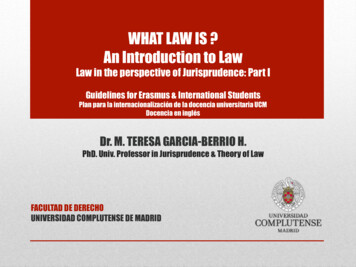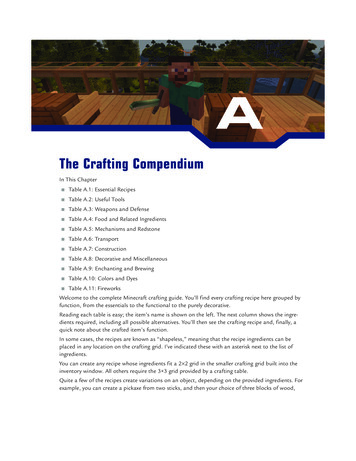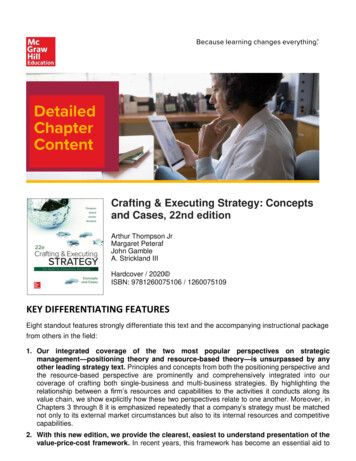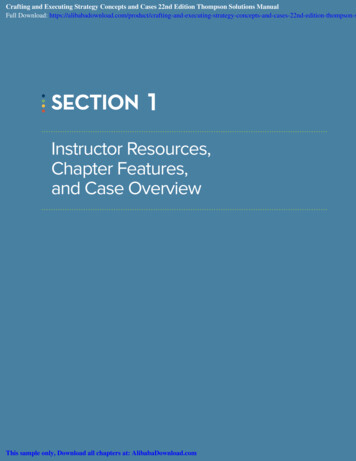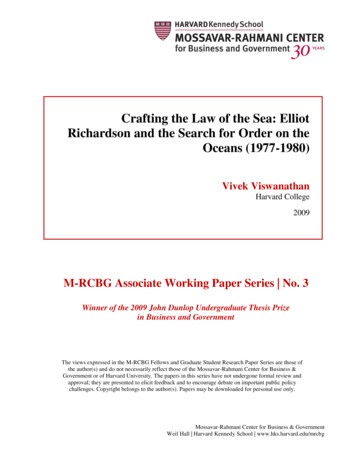
Transcription
Crafting the Law of the Sea: ElliotRichardson and the Search for Order on theOceans (1977-1980)Vivek ViswanathanHarvard College2009M-RCBG Associate Working Paper Series No. 3Winner of the 2009 John Dunlop Undergraduate Thesis Prizein Business and GovernmentThe views expressed in the M-RCBG Fellows and Graduate Student Research Paper Series are those ofthe author(s) and do not necessarily reflect those of the Mossavar-Rahmani Center for Business &Government or of Harvard University. The papers in this series have not undergone formal review andapproval; they are presented to elicit feedback and to encourage debate on important public policychallenges. Copyright belongs to the author(s). Papers may be downloaded for personal use only.Mossavar-Rahmani Center for Business & GovernmentWeil Hall Harvard Kennedy School www.hks.harvard.edu/mrcbg
CRAFTING THE LAW OF THE SEAElliot Richardson and the Search for Order on the Oceans1977-1980byVivek ViswanathanA thesis submitted to theDepartment of Historyin partial fulfillment ofthe requirements for theDegree of Bachelor of ArtsWith HonorsHarvard UniversityCambridgeMassachusettsMarch 19, 2009
TABLE OF CONTENTSIntroduction: “The Man for All Seasons” 31. “A Constitution for the Oceans” 212. “On the Point of Resolution” .493. “‘Fortress America’ Is Out of Date” .83Conclusion: “To Adapt and Endure” .114Works Cited .126
Introduction“The Man for All Seasons”Between 1969 and 1980, Elliot Lee Richardson served in a succession ofinfluential positions in American government: Under Secretary of State; Secretary ofHealth, Education, and Welfare; Secretary of Defense; Attorney General; Ambassador tothe Court of St. James’s in the United Kingdom; Secretary of Commerce; andAmbassador to the United Nations Convention on the Law of the Sea. He had servedbefore in Massachusetts as the United States Attorney, the Attorney General, and theLieutenant Governor. In his youth, he had participated in the D-Day invasion ofNormandy, for which he received the Bronze Star; served as president of the HarvardLaw Review; and clerked for two of the most eminent jurists in American history, JudgeLearned Hand and Justice Felix Frankfurter. In old age, he received the PresidentialMedal of Freedom, the nation’s highest civilian honor. In his prime, he played a pivotalrole in the events that led to the only resignation of an American president.He was, former congressman James Leach remembered when Richardson passedaway in 1999, the Republican Party’s “man for all seasons.” 1 Yet we know little abouthim. There are plenty of archival sources: Richardson’s personal papers at the Library ofCongress consist of 165,000 items, contained in more than 400 boxes that togetheroccupy 238 linear feet of shelf space. 2 In addition to his government memoranda,Richardson wrote letters, delivered speeches, granted interviews, composed notes tohimself, and published scholarly as well as popular articles. He also completed two books1James A. Leach, “Standing Up for Republicanism,” New York Times 15 Jan. 2000.Allan J. Teichroew and Brad E. Gernard, eds., Register of the Papers of Elliot Lee Richardson,Manuscript Division, Library of Congress, Washington, D.C., 1994.23
that drew on his experience in public life: The Creative Balance: Government, Politics,and the Individual in America’s Third Century, which he had the opportunity to writeafter his unplanned exit from the Nixon administration in what became known as theSaturday Night Massacre; 3 and Reflections of a Radical Moderate, a series of essays thathe published shortly before his death. 4 But he never recounted his life or explained whathe believed to be his political legacy. When asked to write a memoir, he would reply, “Idon’t know where to start.” 5The scholarly work on Richardson’s life is sparse. While Richardson is cited inhundreds of books about American politics in the 1970s, especially those that discussWatergate, he is not the subject of a single one, although Donald Carr, an attorney inWashington, D.C., is researching a biography. 6 The most substantive essay onRichardson’s life is Thomas Vance’s “Elliot Richardson and the Virtue of Politics: ABrief Biography,” a 25,000-word piece published by the Council for Excellence inGovernment. 7 Vance, a retired Army Reserve officer, also recently published “TheMentors of Elliot Richardson” in the Massachusetts Historical Review. 8 An essay inPublic Integrity by James Pfiffner, a public policy professor at George Mason University3The Saturday Night Massacre refers to the resignation of Richardson as Attorney General on the night ofSaturday, October 20, 1973. Richardson had refused to comply with Richard Nixon’s order to fire theWatergate special prosecutor, Archibald Cox. Richardson’s deputy, William Ruckelshaus, also resignedrather than comply with the order. Solicitor General Robert Bork, the highest-ranking official remaining atthe Justice Department, dismissed Cox later that night.4Elliot L. Richardson, The Creative Balance: Government, Politics, and the Individual in America’s ThirdCentury (London: Hamish Hamilton, 1976); Elliot L. Richardson, Reflections of a Radical Moderate (NewYork: Pantheon Books, 1996). Richardson also wrote a third book, The Uses and Limitations of Law (NewDelhi: Tata McGraw-Hill, 1982), which received less attention.5Janet H. Brown, telephone interview, 12 Jan. 2009.6Donald Carr, telephone interview, 13 Jan. 2009.7Thomas J. Vance, Elliot Richardson and the Virtue of Politics: A Brief Biography (Washington, D.C.:Council for Excellence in Government, 2000), dsonbio.pdf [accessed 18 Jan. 2009].8Thomas J. Vance, “The Mentors of Elliot Richardson,” Massachusetts Historical Review, vol. 8 (2006):105-129.4
who had co-authored several articles with Richardson, explores Richardson’s career andphilosophy of government. 9 Richardson is also featured in Geoffrey Kabaservice’s TheGuardians: Kingman Brewster, His Circle, and the Rise of the Liberal Establishment. 10But that is all. What else we know about his life has been cobbled together from newsitems, magazine profiles, memoirs, and the recollections of those who knew him well.The first purpose of this thesis is biographical: to serve as a resource for thoseinterested in his remarkable public life. While this project began as a biography, it hasbecome something quite different. Readers may wonder why, given all of the posts thatRichardson held, this thesis focuses on the four years during which he chaired theAmerican delegation to the Law of the Sea conference. In its 1,960-word obituary ofRichardson, the Boston Globe devoted two sentences to Richardson’s participation in theLaw of the Sea conference, while the New York Times and Washington Post eachincluded just one sentence in their own retrospectives. 11 The 1,200-word entry forRichardson in the American National Biography addresses his participation at the Law ofthe Sea conference in a dependent clause. 12 “There is possibly no international topicmore likely to produce a large yawn than the Third United Nations Conference on theLaw of the Sea,” admitted John Temple Swing, who served on the delegation. 13 The9James P. Pfiffner, “Elliot L. Richardson: Exemplar of Integrity and Public Service,” Public Integrity, vol.5, no. 3 (Summer 2003): 251-269.10Geoffrey Kabaservice, The Guardians: Kingman Brewster, His Circle, and the Rise of the LiberalEstablishment (New York: Henry Holt, 2004).11Mark Feeney, “Elliot Richardson, Versatile Man, is Dead,” Boston Globe 1 Jan. 2000; Neil A. Lewis,“Elliot Richardson Dies at 79: Stood Up to Nixon and Resigned in ‘Saturday Night Massacre,’” New YorkTimes 1 Jan. 2000; Bart Barnes, “Elliot Richardson Dies at 79: 1973 Resignation as Attorney GeneralShocked the Nation,” Washington Post 1 Jan. 2000.12Edward L. Lach, Jr., “Richardson, Elliot,” American National Biography Online (April 2000), les/07/07-00738.html [accessed 18 Jan. 2009].13Letter, Elliot L. Richardson to John Temple Swing, 6 Nov. 1979, “‘S’ miscellaneous—1979,” Box 393,Elliot Lee Richardson Papers (henceforth ELR Papers), Manuscript Division, Library of Congress,Washington, D.C.5
conference cannot match the excitement of policymaking at the Cabinet level, let alonethe high drama of the Saturday Night Massacre.Yet Richardson’s participation at the Law of the Sea conference encompassedmuch that is riveting about his life. Watergate has established Richardson as a historicalfigure, and Richardson’s résumé is enough reason for scholars of history and governmentto examine his life, if only to wonder how one individual managed to serve withdistinction in so many roles. Rather than assessing Richardson’s performance in each ofthe positions that he held, however, this thesis aims to use his involvement at the Law ofthe Sea conference as a lens to evaluate those qualities that distinguished his public lifeand that are the most important parts of his legacy. Chairing the American delegation tothe conference was, Richardson later wrote, “my longest and most demanding tour ofduty in any government job.” 14 The post, which he held from 1977 to 1980, called on hisstrengths, challenged his weaknesses, and tested his patience. It may not have been hismost well-known assignment. It certainly was not, when he left the post, his mostsuccessful assignment. But at the time that he accepted it, he believed that it could be themost important. 15He accepted the assignment at an uncommon moment in his political life. Born in1920 into a family of physicians, he had instead embarked on an alternate path.“Medicine is like reading a book where you know what’s going to happen,” he later14Richardson, Reflections, 218.“I don’t necessarily go along with Henry Kissinger on everything,” Richardson said near the end of histenure at the Law of the Sea conference, “but I’ve collected half a dozen statements from him saying these[Law of the Sea negotiations] are the most important negotiations ever conducted.” Tracy Early, “AnInterview with Elliot Richardson,” New World Outlook (May 1980): 35, “Clippings (Richardson),” Box364, ELR Papers.156
explained. “I wanted a life with more surprises.” 16 He attended Milton Academy,Harvard College, and, following his war service, Harvard Law School, receiving his lawdegree in 1947. In addition to learning the law from clerkships with Learned Hand andFelix Frankfurter, Richardson learned politics from his uncle, Boston City Councilmember Henry Lee Shattuck, and from Senator Leverett Saltonstall, for whom he workedin Washington, D.C. “It would be difficult,” Vance wrote in his study of Richardson’smentors, “to imagine a richer collection of people engaged in shaping the direction of anindividual’s life.” 17 By 1977, he had not only cemented his reputation for integrity buthad demonstrated his ability in the posts that he had held. His Clark Kent-like appearanceand elegant manner reinforced the perception of his ability. “I approach any job inessentially the same way,” he would say. “I don’t consider that the subject matter makesany particular difference. If I don’t know it, I learn it. I try to find out what it is necessaryto do, and then do it.” 18 Gerald Ford was reported to have considered him for the vicepresidency, and many believed Richardson had his sights set on the presidency.Richardson did not discourage such talk. “I’ve spent most of my adult life holdingpublic office in one form or another,” he often responded when asked about his politicalambitions. “The presidency is the top job in my line of work.” 19 But when Jimmy Carterdefeated Ford in 1976, Richardson was unsure of his next step. With a Democrat enteringthe White House, commentators discussed the possibility of Richardson returning hometo Massachusetts, after a decade in Washington, D.C., to challenge then-Governor16Feeney, “Elliot Richardson, Versatile Man, is Dead.” The obituary noted: “The family calling wasmedicine. Mr. Richardson’s great-grandfather, both grandfathers, a grandmother, three uncles, his father,and both his brothers were physicians.”17Thomas J. Vance, “The Mentors of Elliot Richardson,” 106.18Feeney, “Elliot Richardson, Versatile Man, is Dead.”19Robert L. Hassett, “Elliot’s Eye isn’t on Dukakis,” Boston Herald American 5 Oct. 1977, “Political—Clippings,” Box 389, ELR Papers.7
Michael Dukakis in 1978. One poll showed him with a positive rating of 73 percent and anegative rating of 13 percent, comparable to Senator Edward Kennedy’s 75-22 rating andmaking Richardson “better known and better liked in Massachusetts than at any point inhis political career.” 20 Some speculated that Richardson planned to enter the race for theRepublican presidential nomination in 1980. Other than the fifteen months that elapsedbetween Richardson’s resignation in the Saturday Night Massacre and his appointment asAmbassador to the Court of St. James’s by Ford, Richardson had held public officecontinuously since January of 1965. It seemed an opportune moment to pause, to “surveythe horizon” in his phrase, and to reflect on his next move. 21Except that Richardson had never been one to plot his path upward. “Each job,each case, carries its own reward, and beyond that there are no worthwhile rewards,” heonce said. “The reward is in doing the job well, in doing the best you can, and in thebelief that it was useful.” 22 Jonathan Moore, one of Richardson’s closest advisers and hisformer chief of staff, remembered that if Richardson “had a chance to do a job that wasimportant, regarded as important, that he was challenged by, he would tend to dothat thinking that it would not foreclose his possibility of a higher political future, buthe would not tend to be distracted by the fact that it might not be the best way to get20John F. Becker, “Eight Years Later, Teddy’s Back on Top as Favorite Son,” Boston Herald American1977 (date not listed), “Political—Clippings,” Box 389, ELR Papers.21“I will survey the horizon very carefully and should I then decide to run [for office] I will certainly letyou know,” Richardson wrote to a supporter. Letter, Elliot L. Richardson to David F. Asman, 3 Aug. 1979,“‘A’ miscellaneous,” Box 357, ELR Papers.22“Legends in the Law: A Conversation with Elliot L. Richardson,” Bar Report, vol. 23 (1995). Richardsonrecalled the advice that Felix Frankfurter had given him on the subject of building a successful career:“Elliot, I don’t think you ought to develop career goals. I’ve known quite a few men who did this, and thenthey did everything in their power to fulfill this ambition. They were constantly calculating how to takeadvantage of some opportunity or connection that would move them along toward their goal. Yet most ofthem awaken in their fifties to the realization that they are never going to achieve their great ambition. Ontop of that disappointment, they realize that they undercut the satisfaction of what they were doing bytrying to use it for the sake of something else.” Richardson agreed. “I thought that was very insightfuladvice,” he said later, “and I took it to heart.”8
there.” 23 Henry Richardson also recalled that his father “tended to really appreciate whatwas in front of him.” 24 During the 1976 presidential campaign, Richardson had attackedCarter, declaring that Carter’s inexperience in foreign affairs “makes me shudder.” 25 Yetthere was, Moore recalled, “considerable congeniality” between Carter and Richardson’sforeign policy views, helped by the fact that both Richardson and Carter’s Secretary ofState, Cyrus Vance, were “patrician internationalists, the successors to the [John]McCloy, [Robert] Murphy, Dean Acheson group.” 26 J. T. Smith, another closeRichardson adviser, added that the decision to offer a position to Richardson was Vance’sidea and, given their friendship, “wasn’t a surprising idea.”27 Vance, when asked later inlife why he chose Richardson, emphasized that “I’ve known him and liked him andadmired him for all these many years To me there was only one person to take hold ofthe [Law of the Sea assignment] and really lead it because it is probably one of the mostdifficult tasks that anybody has ever had put before them.” 28 So it was that Richardsonaccepted the opportunity to head the American delegation to the Law of the Seaconference in January of 1977, not foreclosing the possibility of leaving his post to runfor governor or president but with the understanding that he had not chosen the mostdirect path to those offices. While serving at the Law of the Sea conference, Richardsonoften wrestled with his political ambition, a subject that this thesis will explore in somedetail. But he focused on the task in front of him, a task that in this instance offered the23Jonathan Moore, personal interview, Cambridge, MA, 18 Nov. 2008.Henry Richardson, telephone interview, 16 Feb. 2009. [References to Henry Richardson in the text andfootnotes will include his full name. Citations of “Richardson” that do not include a first name should beunderstood as referring to Elliot L. Richardson.]25“Speech prepared for delivery by Secretary of Commerce Elliot L. Richardson to a combined luncheonof the Chairman’s Club, Republican Executive Committee on Monroe County, and elected officials—Rochester, N.Y.,” 26 Oct. 1976, “1976—22 Oct.-13 Dec.,” Box 352, ELR Papers.26Jonathan Moore, interview.27John Thomas Smith II, telephone interview, 9 Jan. 2009.28Cyrus R. Vance, telephone interview by Thomas J. Vance (no relation), 24 Apr. 1995.249
chance to participate in what he called an “exciting collective experiment on behalf ofmankind.” 29The four years that Richardson spent in the Law of the Sea assignment illustrate,to an extent greater than in any other position that he held, the characteristics thatanimated his public life. First was his love of complexity. “The difficulty of the choicesconfronting the democratic process is bound to increase in rough proportion to theincrease in complexity,” he wrote. 30 Yet such choices are necessary, he emphasized.“You can’t set priorities without making choices, and you can’t fulfill priorities withoutformulating workable strategies. And none of the above is possible without establishingand communicating goals.” The core strength that Richardson brought to governmentservice, enabling him to serve in posts across the government, was his ability to managethis process. He and his chief aides became so adept at transitioning from one agency tothe next that the Washington Monthly published an article, “How to Take Over theGovernment,” that detailed their skill. 31 One staffer referred to his time working forRichardson as the “equivalent of several Ph.D.’s in public administration.” 32 Richardsonrelished the opportunity to solve public problems that had defied solution.The intractability of the Law of the Sea conference therefore piqued, and held, hisinterest. Three years into the position, he wrote to Lincoln Bloomfield, his collegeclassmate serving on the National Security Council as Director of Global Issues, “Icannot conceive of a more complex corpus of multilayered and multifaceted issues.” 3329“Comments on Financing by Ambassador Elliot L. Richardson,” 10 Mar. 1977, NSA-Global Issues,“Law of the Sea (LOS), 2-6/77,” Box 37, Jimmy Carter Library.30Richardson, Reflections, 55.31Charles Peters, “How to Take Over the Government,” Washington Monthly (September 1974): 15-23.32Thomas J. Vance, “The Mentors of Elliot Richardson,” 124.33Letter, Elliot L. Richardson to Lincoln P. Bloomfield, 2 Aug. 1979, “‘B’ miscellaneous,” Box 359, ELRPapers.10
That difficulty, which Caitlyn Lance Antrim, a member of the American delegation,compared to “putting your hands on a puzzle in which you didn’t have all the pieces,”only enhanced his enjoyment. 34 Richardson, who as a judicial clerk had implored JusticeFrankfurter for an hour every morning to read Shakespeare, loved the life of the mind. 35He once summed up his interest on a book he was reading on nineteenth-centuryJapanese military strategy by saying, “If I had known that I was going to die thisafternoon at 2 p.m., I would still have kept reading that book.” 36 That attitude carriedover to the Law of the Sea conference where, Donald Carr recalled, he “was absolutelyfascinated by the number of moving parts.”37 “I really do think it was his favorite job,”Henry Richardson later remembered of his father’s participation in the conference. 38The job also illuminated Richardson’s humility. Humility was not the quality thatmost of those introduced to Richardson associated with him. Richardson, one profilenoted, “could make a bad first impression: frosty, arrogant, pedantic.” 39 This tendencywas particularly pronounced on television where, according to Carr, Richardson “lookedwooden and stiff.” 40 Yet underneath was a profound lack of condescension that stemmedfrom his early life. Richardson was a “well-to-do scion of Massachusetts history andmoney” and “somewhat of a playboy in college,” remembered Bloomfield, who attendedHarvard with Richardson, but his war service “bespake his character.” 41 Richardson34Caitlyn Lance Antrim, telephone interview, 20 Feb. 2009.Lewis, “Elliot Richardson Dies at 79: Stood Up to Nixon and Resigned in ‘Saturday Night Massacre.’”According to the obituary, Frankfurter “was so impressed with Mr. Richardson that in 1953 herecommended that he be named president of Harvard even though he was only 33 years old.”36Pfiffner, “Elliot L. Richardson: Exemplar of Integrity and Public Service,” 268.37Carr, interview.38Henry Richardson, interview.39James Bennet, “The Lives They Lived: Elliot Richardson, b. 1920; The Longest Day,” New York TimesMagazine 7 Jan. 2001.40Carr, interview.41Lincoln P. Bloomfield, telephone interview, 20 Feb. 2009.3511
himself recalled the influence of his war experience, saying that he came away with a“sense of our common humanity as individuals. During those many months of combat, Ifelt a very strong sense of the equal dignity and value of all my fellow soldiers.That has stayed with me.” 42 When he meditated on the virtues of those who hadinfluenced his life, he always pointed to their humility. Learned Hand not only possesseda brilliant mind but was “down-to-earth, friendly, and funny.” 43 Of his uncle, Henry LeeShattuck, Richardson said that the “one thing he could not abide was pretense Heliterally treated everybody the same way.” 44In noting his uncle’s “disinclination to distinguish among people on the basis ofbackground, rank, or wealth,” Richardson identified a quality that he cultivated inhimself. 45 He displayed this quality in his work with the civil service. Every time heentered a Cabinet department, Jonathan Moore remembered, Richardson made a “majorcommitment to win the respect and mobilize the talent of that bureaucracy.” 46 Arriving atthe Justice Department, he encountered what he labeled the “greatest administrativechaos in the American government.” Yet his first message to employees expressed his“respect for the integrity and competence with which you do your jobs.” 47 In his personalinteractions he was “one of the funniest, most enthusiastic, silliest people I have evermet,” remembered Janet Brown, who helped research Richardson’s book, The CreativeBalance, before joining his staff in 1977. “We had some of our best conversationswalking around his home while he was picking up sticks.” 48 At the Law of the Sea42“Legends in the Law: A Conversation with Elliot L. Richardson.”Thomas J. Vance, “The Mentors of Elliot Richardson,” 113.44Ibid., 108.45Ibid.46Jonathan Moore, interview.47Peters, “How to Take Over the Government,” 21.48Brown, interview.4312
conference, his penchant for working on equal footing with other delegations earned himtheir respect. “He was trusted by everyone,” remembered Tommy Koh of Singapore, whoassumed the presidency of the conference in 1980. 49The negotiations symbolized, finally, Richardson’s commitment to and love ofgovernment service. Following his clerkships with Learned Hand and Felix Frankfurter,he had declined an invitation to serve as an assistant to Secretary of State Dean Achesonbecause he believed that he should experience the work of a practicing attorney. Yet hediscovered that private practice “didn’t match the satisfaction of doing a good job for thepublic.” 50 For the rest of his life, however, his interest in government work was allencompassing. In addition to his aforementioned love of its complexity, he possessed akeen sense of its importance. A deputy assistant secretary, he later wrote, “can have awider impact on the national interest than all but a few senior corporate positions.” 51 Healso possessed an inveterate optimism about government work that enabled him to workthrough frustration. “I have always been one of those that H. L. Mencken called the‘optimists and chronic hopers of the world’ and so I view the kinds of problems you bringup as ones that can be solved,” he wrote in 1975 to a student disillusioned by Watergate.“It is always easier to wave away the whole process and forget it, dismissing it asworthless and not worth trying to save,” he said, but added that “despite the complexityof government today, despite its vastness and often remote nature, I think each of us trulycan make a difference.” 52 He carried that attitude into each post that he held.49Tommy T. B. Koh, e-mail interview, 19 Feb. 2009.Edward L. Lach, Jr., “Richardson, Elliot,” American National Biography Online.51Richardson, Reflections, 89.52Letter, Elliot L. Richardson to Gary Lorenz, 2 Jul. 1975, “‘L’ miscellaneous,” Box 296, ELR Papers.5013
It was not a matter of noblesse oblige. Richardson’s background and Harvardeducation resembled that of those public-minded members of the Establishment whomoved seamlessly between government and business interests, as did his dress, a “properYankee costume of linen suit, red tie, white shirt and scrimshaw cuff links.” 53 ButRichardson in fact “had nothing in common with those people,” Jonathan Mooreremembered. 54 “The reason why the Republican National Committee has not recentlyreceived a major contribution from me,” Richardson wrote in response to a fundraisingsolicitation in 1979, “is simple—too much time in government with an income that hasnever kept up with my cost of living.” 55 More than duty or obligation, the sense of beingengaged in a collective enterprise appealed to him. “Whatever success I’ve had is theproduct of several ingredients, in what proportion it would be is hard to say,” he wrote inthe midst of the Law of the Sea conference to a nineteen-year-old asking for advice. “Butperhaps most important is the fact that I always tried to enlist the people I’ve worked within a common approach to the public interest on the merits with the minimum intrusion ofpurely personal considerations.” 56 The possibility that he could encourage such an efforton a global scale, with developing and industrialized nations working side-by-side todraft a workable agreement, drew him to the Law of the Sea conference.Richardson was fond of saying that we all have the defects of our qualities. 57 TheLaw of the Sea assignment, more than any other post that he held, demonstrated the truth53Martin F. Nolan, “Richardson: Soon a Time for Decisions,” 1977 (date not listed), “Clippings (general),Box 364, ELR Papers.54Jonathan Moore, interview.55Letter, Elliot L. Richardson to Anne Armstrong, 5 Nov. 1979, “‘A’ miscellaneous,” Box 357, ELRPapers.56Letter, Elliot L. Richardson to Bill Butts, 21 Jan. 1980, “Nov. 1979 – Oct. 1980,” Box 363, ELR Papers.Richardson also identified stamina, hard work, and the “combination of a good education and somemeasure of native ability” as factors in his success.57Richardson, Reflections, xi.14
of this observation in his own life. 58 His love of complexity often shackled him when heattempted to make his case to others. “Richardson preferred prose like his own, notoverly succinct,” said one of his assistants. 59 Bloomfield, who wrote that “some ofCarter’s fellow Georgians found Boston Brahmin Richardson a kind of alien life form,” 60recalled having once set up a briefing in the White House Situation Room so thatRichardson could explain the importance of the Law of the Sea conference to members ofthe White House staff. It was “a fiasco,” Bloomfield remembered. “Elliot was at hisdullest rather than at his most scintillating.” 61 This tendency interfered with the task ofbuilding support for eventual ratification of the Law of the Sea treaty.His respect for others and his belief in resolving public matters on the merits, bothof them admirable qualities, also led to missteps at the conference. Richardson marveled,his son remembered, at the extent to which the “influence of the ambassadors at theconference was not proportional to the influence of the country that they represented, butto their intellect and mastery of issues.” 62 He had reason to admire his fellowambassadors. In other nations, Janet Brown noted, the position of ambassador to the Lawof the Sea conference was “attached to somebody that was seen as a rising star Elliot’scounterparts were really big deals.” 63 But there were occasions when his respect for hiscounterparts should have been leavened with greater skepticism. Richardson was “not as58An even more potent example from Richardson’s life was his unsuccessful run for the U.S. Senate in1984, a campaign discussed in the conclusion of this thesis. That example, however, exhibited hisweaknesses as a candidate rather than as an administrator, policymaker, or negotiator.59Peters, “How to Take Over the Government,” 22. In his bestselling guide, On Writing Well, WilliamZinsser singled out Richardson for his verbosity, citing his evaluation of affirmativ
Health, Education, and Welfare; Secretary of Defense; Attorney General; Ambassador to the Court of St. James's in the United Kingdom; Secretary of Commerce; and Ambassador to the United Nations Convention on the Law of the Sea. He had served before in Massachusetts as the United States Attorney, the Attorney General, and the Lieutenant Governor.






